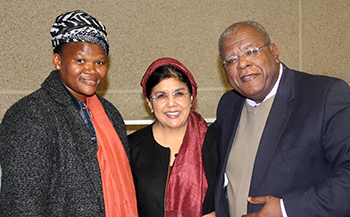Latest News Archive
Please select Category, Year, and then Month to display items
25 March 2024
|
Story Anthony Mthembu
|
Photo Lutendo Mabata
 Prof Nompumelelo Zondi, the newly appointed Vice-Dean: Research and Postgraduate Studies in the Faculty of The Humanities at the University of the Free State (UFS).
Prof Nompumelelo Zondi, the newly appointed Vice-Dean: Research and Postgraduate Studies in the Faculty of The Humanities at the University of the Free State (UFS).
Prof Nompumelelo Zondi has been appointed as Vice-Dean: Research and Postgraduate Studies in the Faculty of The Humanities at the University of the Free State (UFS). Prof Zondi assumed this new role on 1 March 2024 after serving as the Head of Department for African Languages at the University of Pretoria for seven years. “I consider this appointment as an opportunity of growth and learning more about higher education and the Faculty of The Humanities at large,” she said.
Prof Zondi indicates that part of her role is to spearhead the UFS Vision130 within the Faculty of The Humanities, and to ensure that the faculty assists the institution in becoming research-led, student-centred, and globally impactful.
Motivation for assuming this role
One of the primary reasons that led her to consider this role is sharing the knowledge she acquired as part of the Fulbright South African Research Scholar Programme. As a result of that experience and exposure, which went beyond the Ohio State University, she felt it befitting to implement some of the insights she acquired on a bigger scale. Therefore, even though she was impactful in her previous role, Prof Zondi believes that this is an exceptional and more desirable platform to do so. “I feel that I will have easier access to departments within the faculty, while also encouraging and supporting interdepartmental and faculty collaborations,” she explained.
A significant component of Vision 130
He believes that the elements that make up Vision 130 are interrelated. While she considers research central to Vision 130 – as she begins her journey at the UFS, she feels students deserve to be nurtured to further contribute to the university’s impactful research. Thus, student-centredness is the way to go. “I believe that students must be major role players in this Vision130; we must include them in the interactions and discussions that are part of the university’s strategic plan as well as in decision-making processes,” she said. As such, according to Prof Zondi, the more the faculty and the institution care for the students and involve them in Vision130 and in collaborations, the more research outputs the university will achieve.
Beauty personified through written word
2016-07-29

Dr Thozama April, University of Fort Hare
historian, Zubeida Jaffer, current Writer-in-Residence
in the Department of Communication Sciences
at the UFS and author of Beauty of the Heart:
The life and times of Charlotte Mannya Maxeke
and Prof Jonathan Jansen, Vice-Chancellor and Rector
of the UFS at the book launch of Zubeida Jaffer.
Photo: Rulanzen Martin
“It is quite easy to write a book in a professional capacity but very difficult to write a book from the heart.”
These were the words of Prof Jonathan Jansen, Vice-Chancellor and Rector of the University of the Free State (UFS), at the launch of Beauty of the Heart: The life and times of Charlotte Mannya Maxeke by Zubeida Jaffer, the current Writer-in-Residence in the Department of Communication Sciences at the UFS.
Perseverance and dedication yields results
Writing a book from the heart is exactly what Jaffer, an award-winning South African journalist and author, set out to do. “When you make the choice to write a story, you need to be very dedicated,” she said.
As this is Jaffer’s third book, one would think that she would have no difficulty in putting pen to paper. On the contrary, she mentioned that it was, in fact, the hardest book she has written because the narrative was not easy to get hold of.
“I wanted Charlotte’s voice to come through, and it took my team and I three years of research and writing,” she said.
Maxeke’s story helps to shape South African society
The three-person panel, hosted by the UFS Sasol Library and SUN MeDIA, and chaired by Prof Jansen, included Jaffer and Dr Thozama April, University of Fort Hare historian who had done her PHD thesis on Maxeke.
Dr April said that Maxeke’s life story is an inspiring one, as it encourages a rethinking of established narratives. “These established narratives have made it possible for historians and researchers to write about the shaping of South African society,” she said.